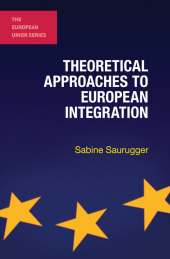 Neuerscheinungen 2013Stand: 2020-01-07 |
Schnellsuche
ISBN/Stichwort/Autor
|
Herderstraße 10
10625 Berlin
Tel.: 030 315 714 16
Fax 030 315 714 14
info@buchspektrum.de |

Sabine Saurugger
Theoretical Approaches to European Integration
Sabine Saurugger
2014. 2013. 304 S. 30 b/w tables, 4 figures. 235 mm
Verlag/Jahr: MACMILLAN EDUCATION 2013
ISBN: 0-230-25143-9 (0230251439)
Neue ISBN: 978-0-230-25143-4 (9780230251434)
Preis und Lieferzeit: Bitte klicken
This major new text provides a uniquely broad ranging introduction to, and assessment of the contribution of, the whole range of theoretical approaches that have been applied to the analysis of European integration. It provides tools for understanding the underlying logic behind the political and economic debates that take place in the EU today.
This major new text provides a uniquely broad ranging introduction to, and assessment of the contribution of, the whole range of theoretical approaches that have been applied to the analysis of European integration. It provides tools for understanding the underlying logic behind the political and economic debates that take place in the EU today.
Introduction.- PART I: WHY INTEGRATE? THEORIES OF INTEGRATION.- 1. Original Debates.- 2. Neofunctionalism.- 3. Intergovernmentalism.- PART II: MAINSTREAMING EUROPEAN STUDIES.- 4. Institutionalisms.- 5. Governance.- 6. Europeanization.- 7. Constructivism.- 8. Sociological perspectives on European integration.- 9. Political theory.- PART III: THE EUROPEAN UNION AND THE WORLD.- 10. International relations and European integration.- 11. Regionalism.- Conclusion.
´An extraordinarily useful map of the state of the art on European integration which masterfully relates scholarship not just from international relations and comparative politics but sociology and political theory too. Everyone interested in the European Union, from students to established scholars, will benefit from this clear, faithful, and comprehensive survey.´ Craig Parsons, University of Oregon, USA
´As the study of the EU is becoming increasingly specialized and compartmentalized, this book accomplishes two seemingly impossible quests: it offers a comprehensive and contextualized but - at the same time - concise and highly readable account of the various theories and frameworks that allow us to capture the multifaceted quality of the EU; but, even more admirably, Saurugger convincingly shows that the study of the EU has been at its most innovative when scholars have abandoned their cosy sub-disciplinary homes to look for inspiration in other disciplinary turfs. What a tour de force!´ Berthold Rittberger, University of Munich, Germany.


